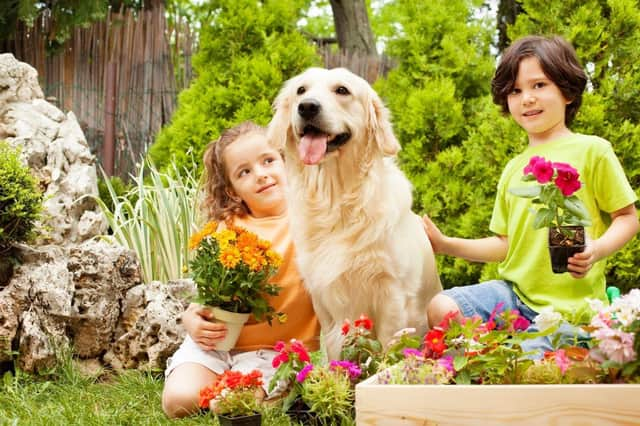Dog Friendly Gardens: Here's how to create the perfect outdoor haven for your adorable dog - including what plants to avoid 🐶
This article contains affiliate links. We may earn a small commission on items purchased through this article, but that does not affect our editorial judgement.


Gardens should be a place of peace and relaxation for both you and your dog – whether it’s playing fetch or simply basking in the sun, spending time in nature is beneficial for both owner and pet alike.
However, if your garden isn’t properly prepared to accommodate a four-legged friend, it can become a potential hazard.
Advertisement
Hide AdAdvertisement
Hide AdTo keep your garden safe and enjoyable for everyone, garden experts Nilufer Danis have put together their advice on the necessary steps to take to ensure your garden is dog friendly.
By taking the necessary precautions, you can make sure your garden is a safe and enjoyable space for both you and your canine companion. With the right planning, it’s possible to have a dog-friendly garden that will be a joy for years to come.
Choosing your plants
Start by selecting plants that are both aesthetically pleasing and dog-friendly. While there are a lot of plants that are poisonous to dogs, there are many beautiful alternatives that won’t endanger your pup. Consider plants like pansies, lavender, daisies and clover for a colourful yet safe garden.
Additionally, be sure to keep any fertilisers or pesticides away from areas where your dog might have access as these can cause stomach upsets or other more serious ailments if ingested.
Here is a list of plants that are dangerous for your dog to eat:
Aloe vera
Chokecherry
Hyacinth
Oleander (tree)
Angel’s trumpet
Lenten rose
Iris
Peace lily
Autumn crocus
Clematis (vine)
Jimsonweed
Potatoes
Azalea
Daffodil
Lantana
Rhododendrons
Begonia (annual)
Daphne
Lily
Rose of Sharon (shrub)
Bittersweet (vine)
Daylily
Lily of the Valley
Sago palm
Bleeding heart
Easter lily
Mistletoe
Tiger lily
Boston ivy (vine)
Elephants ear
Monkshood
Tulip
Boxwood (shrub)
English ivy (vine)
Morning glory (vine)
Wisteria (vine)
Burning bush (shrub)
Foxglove
Mountain laurel (shrub)
Yarrow
Calla lily
Holly
Mums
Yew (bush)
Castor beans
Hosta
Nightshade
Robust plants
Playful dogs can easily damage new or fragile plants by biting the stems or running into them. To make sure your plants stay intact, consider planting native species that are hardier and more resistant to wear and tear. In addition to this, adding a few rocks or stones throughout the garden can provide an area for dogs to rest without disturbing the vegetation.
Secure the perimeter
Another important factor in keeping your garden safe for your furry friend is to create a secure perimeter. If you have a fenced-in garden, check the walls and gates often to make sure they are sturdy and not damaged in any way that could be hazardous if your dog were to escape. If you don’t have a fence, consider investing in one as this will help keep your dog safe and secure in your garden.
Storing Equipment
Be sure to keep any tools that could potentially be dangerous out of reach of your pet. If you’re using a lawnmower or digging equipment, make sure they are stored away when not in use and not accessible by curious paws. Also be mindful of any sharp-edged objects that could cause injury, like broken glass pieces or lawn edgers.
Avoid using chemicals
Advertisement
Hide AdAdvertisement
Hide AdAvoid using any chemical-based products in or around your garden as these can be dangerous for both you and your pet. Instead, opt for natural alternatives such as mulching and composting to keep weeds at bay and nutrient levels up. Avoid using non-organic slug pellets as this could be damaging to your dog if they eat a snail or slug, likewise don't add additives to water features or ponds, as dogs will be tempted to drink from them.
Read more: